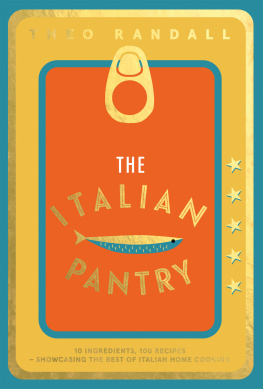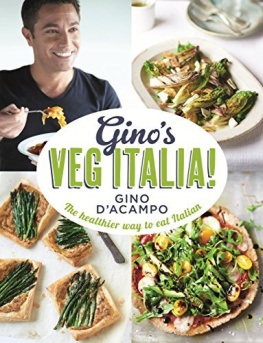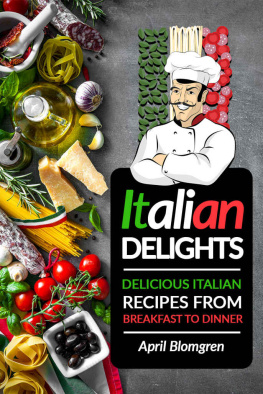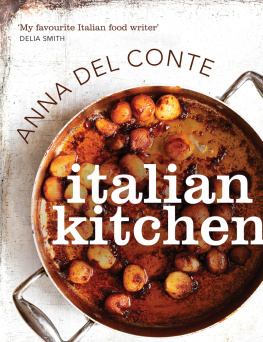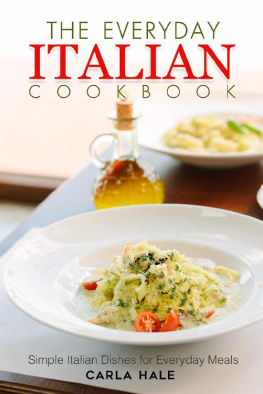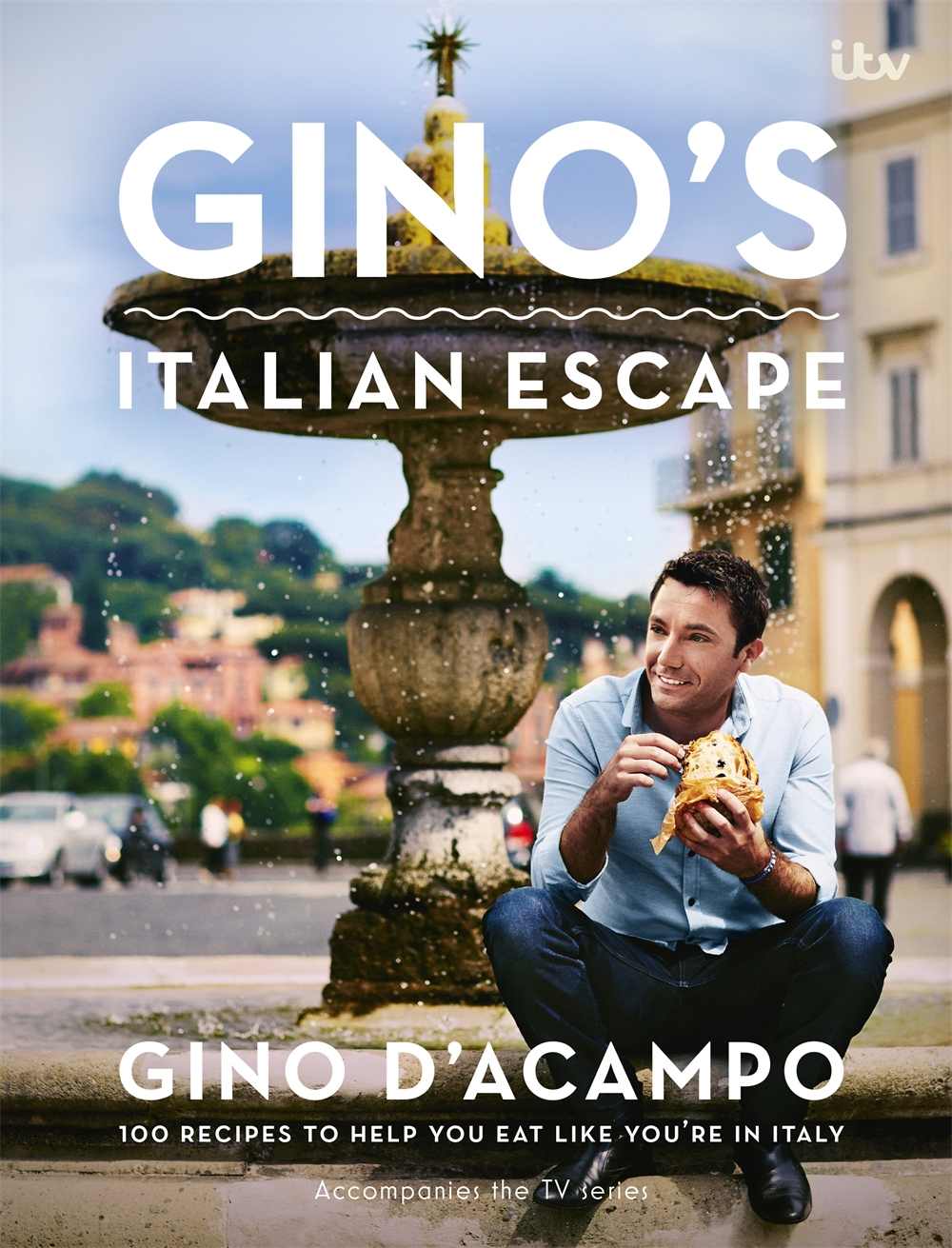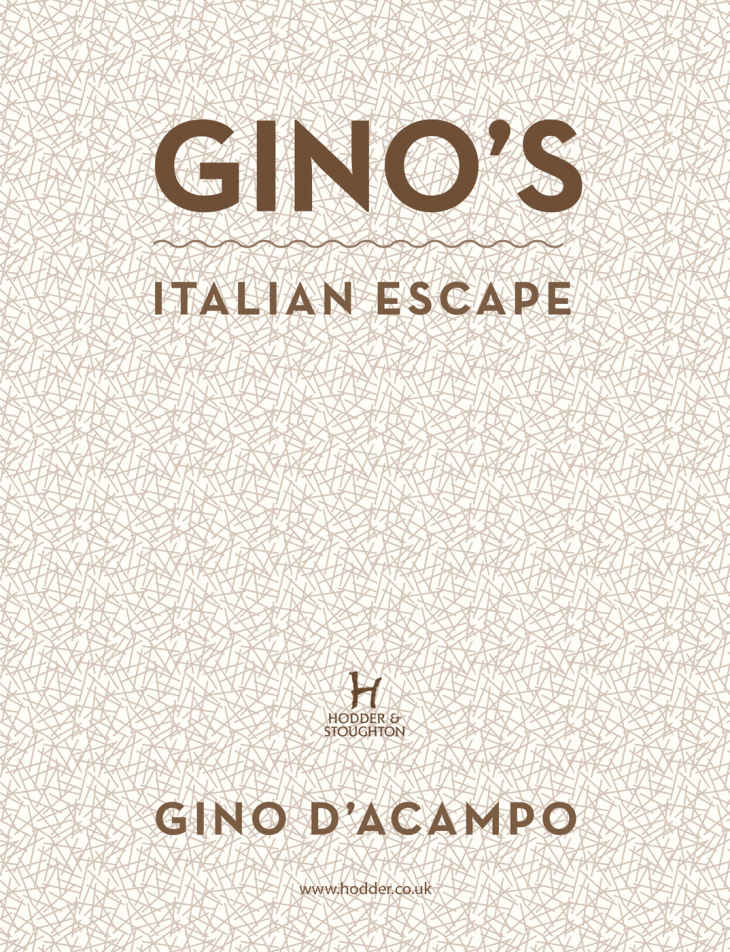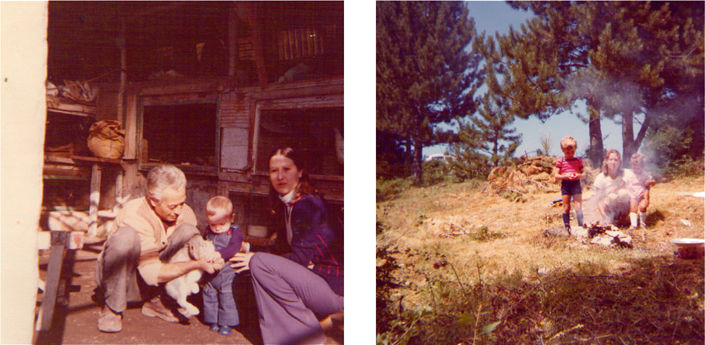First published in Great Britain in 2013
by Hodder & Stoughton
An Hachette UK company
Television series Ginos Italian Escape copyright ITV Studios Limited 2013. Licensed by ITV Ventures Ltd. All rights reserved.
Recipes copyright Gino DAcampo 2013
Photography copyright Matt Russell 2013, except by Matt Russell, copyright ITV Studios Limited 2013
The right of Gino DAcampo to be identified as the Author of the Work has been asserted by him in accordance with the Copyright, Designs and Patents Act 1988.
All rights reserved. No part of this publication may be reproduced, stored in a retrieval system, or transmitted, in Any form or by any means without the prior written permission of the publisher, nor be otherwise circulated in any form of binding or cover other than that in which it is published and without a similar condition being imposed on the subsequent purchaser.
ISBN 978 1 444 75173 4
Hodder & Stoughton Ltd
338 Euston Road
London NW1 3BH
www.hodder.co.uk
I want to dedicate this book to my late father, Ciro DAcampo, who always used to say to me stop dreaming and get on with it
ACKNOWLEDGEMENTS
A big thank you goes to my wife Jess and my kids, for making every day of my life so fantastico!
To my best friend Marco Silvagni, my manager Jeremy Hicks and everybody at Jeremy Hicks Associates and Bonta Italia.
A big kiss to everyone at Hodder & Stoughton for trusting me to write this book with them you guys are great fun.
Grazie to Matt Russell, Georgia Vaux, Laura Fyfe and Gee Charman for making sure that the book and food looked beautiful.
To everybody at ITV for giving me the opportunity to go around Italy filming the series and once again trusting me to work with them.
The BIGGEST THANK YOU goes to my loyal fans, for all the continuous support that you have shown me in the past 10 years.
Buon appetito!
Gino xxx
ITALY IS MY HOMELAND. The land where I grew up as a child and the land that shapes the way I cook and eat today.
Food was always a huge part of my childhood. My grandfather was head chef at Costa Cruises, so I grew up with good food and knowing the importance of good-quality ingredients.
I hated school and am quite happy to admit that I hardly ever went, but at the age of 13 I found my direction in life: food. I enrolled at the Luigi de Medici catering college in Naples and finally found somewhere I wanted to attend every day. Being surrounded by food and cooking all day just seemed so natural.
After finishing college and working in Italy for a bit, I decided that I needed to venture to pastures new. When I was 20 years old I moved to London to work in restaurants and forge my career in food.
The UK is now my home and where my family live, but I still have firm roots in Italy. I guess there are two reasons for this. First, traditions and food culture are bred into every Italian, and living in a different country, even for 16 years, will never dilute them I still cook Italian food every day and we are lucky enough to visit Italy on family holidays. Second, Italian cuisine, with its emphasis on simple, good-quality ingredients enjoyed in the company of family and friends, is such a simple formula that it works wherever you are in the world.
When I do venture back to Italy, family is always at the forefront of my mind. In true Italian style many of my close relatives still live in the area where we grew up. Aunts live next door or close to my cousins, grandparents live within walking distance of their grandchildren, and doors are left open for the family to gather in whichever house happens to be at the heart of the family on that particular day or with whoever has a pot of pasta boiling away.
I love going back there to see everybody, and when filming for my TV series I finally got to cook for them. Believe it or not, I have never cooked for my extended family. If they come to the UK, they want to sample the various amazing restaurants we have here (they are unlikely to find a curry house in Torre del Greco), and if we go to Italy, they want to cook for me. So this was my opportunity to cook for them and, to be honest, I was a little nervous about it. Cooking in other peoples kitchens can sometimes be a bit awkward but the famous Italian hospitality means that they are offended if you dont treat their house as your own mess and all!
Family is at the centre of any Italian table, and this was especially brought home to me on my various adventures around the south of Italy, from the lemon groves on the Amalfi coast, where Salvatore and his family both grew the lemons and made limoncello from them, to Casolare da Tobia, the family-run restaurant on the volcano crater just outside the city of Naples.
Families eat together and work together. Generations of the same family work side by side, taking responsibility for their own products but also sharing the burden of everyday life. This was so apparent at the cherry orchard in Castello, where Ciro worked on his area of land and his brothers on the other plots but they all shared the workers who sorted and stacked the cherries. A true family business.
Not surprisingly, in a country where food plays such a prominent role, meals in Italy can be rather elaborate affairs and we like to take our time. We have courses, as in England, but are slightly stricter about what can be served in each. We start with an aperitivo, or aperitif, often accompanied by nibbles. This is nearly always followed by antipasto, which is usually (but not always) a cold starter of cured meats, cheeses, vegetables and salads. We will then have our primo (first course), often a pasta, soup or risotto option. Still hungry? OK, now we enjoy our secondo (main course), traditionally the heartiest part of the meal, which will always be either fish or meat. And if you can still fit it in, theres dessert and coffee, followed by a digestivo, or liqueur. Now you know why we go for siestas after lunch!
Its sometimes difficult to generalise about Italian food because Italy is made up of 20 regions and every town or village makes the same dish in very different ways. Local cooking is shaped by geographic, historical and climatic differences, and todays Italian cuisine is the result of the slow integration of the countrys many different regional traditions and food customs. When Italy was unified in the mid-19th century, only about 2 per cent of the total population was able to speak and understand the national language instead they spoke their own regional dialects. The same kind of separation was also reflected in the food.
Food in Italy is still very regional and each area is known for specific dishes, ingredients and pasta shapes. Bari, for example, is noted for its orecchiette, and you can still see women sitting in the cobbled streets of the old town making it by hand. Gragnano, by comparison, is known for fusilli, made by rolling linguine around a long, thin metal rod, traditionally an umbrella spoke. It is still rolled by hand to this day, and I have to say it is easier than making orecchiette by hand I have tried both. Speed was not on my side and the factory definitely wouldnt give me a job!



